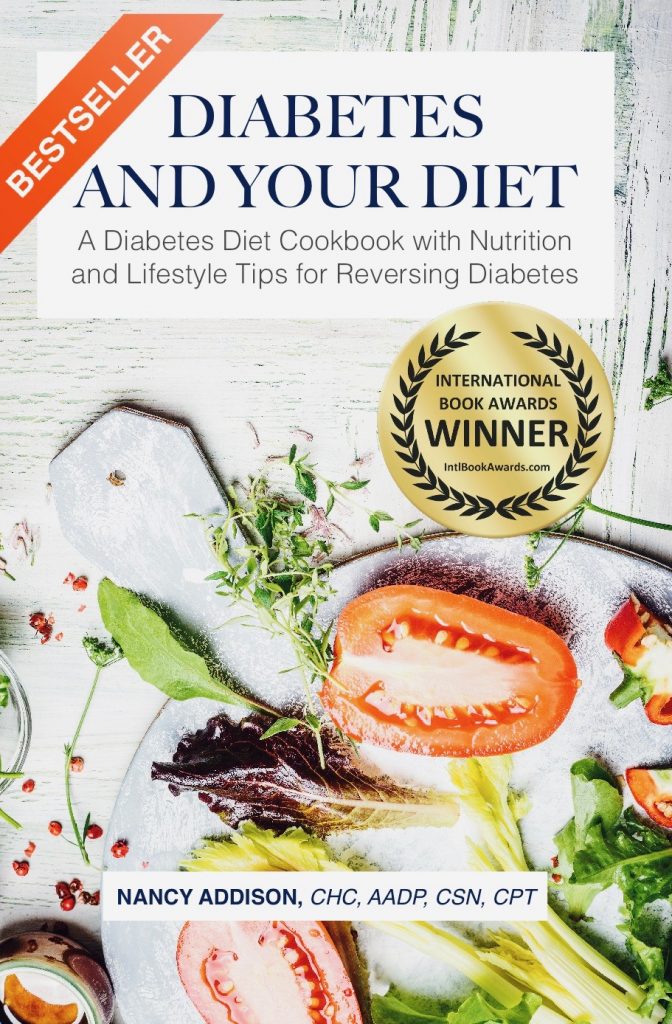Since the publication of my book, “Diabetes And Your Diet,” I have been getting many questions and comments concerning people with Type 1 Diabetes. In my book/cookbook, I site a study conducted by Dr. james Anderston in the 1990’s.
“Dr. James Anderson studied 25 Type 1 and 25 Type 2 diabetics. This study involved placing the patients on a high-fiber, high-carbohydrate, low-fat diet in a hospital setting. Dr. Anderson initially put the patients on the American Diabetes Association recommended diet plan for one week. Then he switched them over to a vegetarian, plant-based diet for three weeks.
None of these patients were overweight when they started the study, but they were on insulin shots to control their blood sugar levels. All through the study, Dr. Anderson measured their blood sugar levels, their cholesterol levels, their medications, and their weight. Type 1 diabetics cannot produce insulin, and it was thought that dietary changes would not affect this situation.
But, the results showed that after three weeks on a vegetarian, whole-food, high-fiber diet, the “Type 1 diabetics were able to lower their insulin medication by an average of 40%”, “their blood sugar profiles improved dramatically”, and their “cholesterol levels dropped by 30%”.[i]
These results were more impressive with the Type 2 diabetics who had not incurred as much damage to their pancreas. After three weeks on the high-fiber, vegetarian diet, 24 of the 25 Type 2 diabetics could discontinue their insulin medication completely.
The one Type 2 diabetic who wasn’t able to get off his medication had been a 25-year diabetic taking 35 units per day. After three weeks of vegetarian food, his requirement dropped down to only eight units per day. As he continued the vegetarian eating plan at home, he was able to cut out all insulin shots after another eight weeks.[ii]
[i] Anderson, James W. (Dec., 1990). “Dietary Fiber and Human Health.” HortScience, 25(12): 1488-1495. http://hortsci.ashspublications.org/content/25/12/1488.full.pdf
[ii] Ibid.
Diabetes has increased by more than 700 percent in the last 50 years. About one in four people in the US have been diagnosed with diabetes or pre-diabetes. Juvenile diabetes numbers have been rising at a very rapid rate, especially for white youths ages 10–14, whose rates have risen 24 percent in the past few decades. More alarming is the 200 percent increase in diabetes among black children. Even worse, recent studies predict these numbers will double by 2020 for all youth.[i]
As I’ve researched health and nutrition over the past 28 years, I’ve seen this increase directly correlate with a number of trends:
- The increasing addition to our food of harmful substances such as high-fructose corn syrup, artificial sweeteners, trans fats, food dyes, monosodium glutamate, and other chemicals.
- Low exposure and absorption of Vitamin D in our society.
- The decrease in exercise and fresh air as people become more sedentary, watching more television, or working at computers.
- The growth in the genetically modified food industry, which results in food being deficient in nutrients that are necessary for health and well-being.
- The increased number and variety of unhealthy GMO crops (example: corn, soy, and wheat) that have cancer-causing poisons built into them and/or applied to them when they are in the field.
Food is our medicine. But food and our environment have become toxic and unhealthy, and our increasingly sedentary lifestyles are not helping.
However, research has shown type 2 diabetes is preventable and virtually 100 percent reversible, simply by implementing dietary and lifestyle changes which are easy and inexpensive. In my book, Diabetes And Your Diet, I discuss how to eat higher quality foods that will contribute to your overall health. I go into detail on nutrients, preparation, recipes, and lifestyle suggestions you can use to move yourself into a healthier, happier life.
Warning signs that you may be diabetic.
Frequent infections of the skin and/or urinary tract
Numbness or tingling in hands and/or feet
Hunger, even after eating
Slow wound healing
Excessive thirst
Blurred vision
Irritability
A diabetic can no longer produce sufficient insulin to process glucose (sugar) in the blood. To lower glucose levels, diabetics need to increase insulin, either by taking medication that increases their own insulin production, or by injecting insulin directly. (A diabetic can be on four or five medications to control blood glucose.) But these treatments do nothing to address the root cause of the problem.
Diabetes medications also have serious side effects. For example, Avandia was used in a two-year study published in the New England Journal of Medicine. This study linked Avandia to a 43 percent increased risk of heart attack, along with a 64 percent higher risk of cardiovascular death as compared to patients being treated with other methods.[ii]
Even with those devastating results, the FDA voted to allow it to remain on the market. In the words of wise medical researcher Dr. Bruce Lipton, “There is no such thing as side effects. They are direct effects.” I recommend being thoughtful about what you put in your body.
Cutting down on these foods will keep blood glucose low. Replacing those unhealthy carbohydrates with healthier varieties of plant-based protein, fats, and carbohydrates—the most naturally satisfying of foods—often eliminates hunger. People can lose weight without starving themselves, or even counting calories.
When you want to reverse disease, one of the most important dietary changes you can make is the elimination of sugar and refined grains from your diet.
Diabetes is a disorder of insulin and leptin signaling, a disorder which can be caused by processed sugar and chemicals in processed food. Leptin is a hormone produced in your fat cells. Leptin’s primary functions include regulating your appetite and body weight. It tells your brain when to eat, how much to eat, and when to stop eating, which is why it’s called the “satiety hormone.”
Many of the chemicals and processed, refined sugars in so many of the fast and processed foods and drinks on the market today interfere with this hormone and prevent it from signaling. Therefore, eliminating those chemicals and processed sugars will help your body heal and begin to function in a healthier way.
Jeffrey M. Friedman and Douglas Coleman were two researchers who discovered the leptin hormone in 1994.[iii] In the research, Friedman found that obese people have very high levels of leptin in their blood. He decided to look into that. He found that “obesity can cause a resistance to leptin—in other words, the signaling pathway for leptin becomes skewed in obese people, causing the body to over-produce leptin just as it does glucose when you are insulin-resistant.”[iv]
Friedman and Coleman also discovered that leptin is responsible for the accuracy of insulin signaling and for your insulin resistance. Elevated insulin levels are not only symptoms of diabetes, but also heart disease, peripheral vascular disease, stroke, high blood pressure, cancer, and obesity.
Thus, the primary role of insulin is NOT to lower your blood sugar, but to store the extra energy for future consumption (as glycogen, a starch). Insulin’s ability to lower your blood sugar is merely a “side effect” of this energy storage process. Ultimately, this means diabetes is both a disease of insulin and of a malfunction in leptin signaling.
That’s why “treating” diabetes by merely concentrating on lowering blood sugar can be a dangerous approach. It does not address the actual issue of metabolic miscommunication that’s going on in every cell of your body when your leptin and insulin levels are disrupted and stop working together the way they should.”[v]
What this research has shown is that your diet and weight can have an incredible effect on your health and be more effective than any known drug.
Everyone deserves to be radiantly healthy. When you give the body the right tools, it can do miraculous things.
In addition to adding more plant-based foods to your diet, there is a supplement, Protandim, that has been studied extensively and found to help with cell damage and oxidative stress. It can help reduce oxidative stress by 40% in 30 days. (I recently started taking it for my overall health.)
The studies show it can help with heart disease, diabetes, and cancer, as well as many other health situations. It’s been nominated for two Nobel Prizes for Medicine and has had over 26 peer reviewed medical papers written about it.
ABC did a PrimeTime Update on this supplement to show it’s benefits for aging and overall health. (If you want to try this supplement, let me know, and I’ll be happy to help you in choosing which one of their products would be best suited for you and your health situation.)
I counsel people for their diet and health. So, let’s get started! Contact me today. I would love to work with you.I can talk to you on Skype, so I can help you where ever you live.
In addition to my counseling service, my internatinal award-winning book, Diabetes And Your Diet” can be a good resource for anyone dealing with diabetes.
Winner of Best Health And Diet Book of the Year, 2018, in the Beverly Hills Book Awards. It’s also in Audio book.
The book, “Diabetes And Your Diet” gives you the power to make healthy choices. This comprehensive guidebook will help you to create long-term, sustainable, and life-enhancing strategies for preventing or reversing diabetes through nutrition and lifestyle.
Nancy’s book motivates, and teaches easy-to-implement suggestions, as well as offers incredible insight into health and wellness for diabetics of all ages. Her book has over 65 diabetic-friendly recipes included! Healthy foods combined with positive lifestyle tips equals a healthy life!
“Nancy Addison’s book is a comprehensive guidebook to create long-term, sustainable, and life-enhancing strategies through nutrition. In this book, Diabetes And Your Diet, she inspires, motivates and teaches easy-to-implement suggestions as well as offers incredible insight into reversing diabetes and restoring health and wellness.”
– Gary L. Massad, M.D. FACOM, FAASM, FAC, LM. Past attending physician to the 1984 and 1996 Olympic Games, attending physician to United States Cycling Federation, USTAA, and USMAA
Click here to view this nutritious cookbook today!
Healthy Eating Can Be Delicious!
Winner for Best Health Book of the Year, 2017,
International Book Awards!
[i] Lipman, T.H., et al. (June, 2013). “Increasing Incidence of Type 1 Diabetes in Youth.” Diabetes Care.
[ii] Nissan S.E., et. al. (June, 2007). “Effect of Rosiglitazone on the Risk of Myocardial Infarction and Death from Cardiovascular Causes.” New England Journal of Medicine.
[iii] JCI (October 1, 2010). J Clin Invest, 120(10): 3413–3418. DOI: 10.1172/JCI45094
[iv] Mercola, Joseph. “The Deliberate Lies They Tell about Diabetes”. http://www.mercola.com/diabetes.aspx#_edn5
[v] Ibid.
The information from Nancy Addison and Organic Healthy Lifestyle LLC is not offered for the diagnosis, cure, mitigation, treatment, or prevention of any disease or disorder nor have any statements herein been evaluated by the Food and Drug Administration (FDA). We strongly encourage you to discuss topics of concern with your health care provider.
Medical Disclaimer: Information provided in this article, book, podcast, website, email, etc. is for informational purposes only. The information is a result of years of practice and experience by Nancy Addison CHC, AADP. However, this information is NOT intended as a substitute for the advice provided by your physician or other healthcare professional, or any information contained on or in any product label or packaging.





